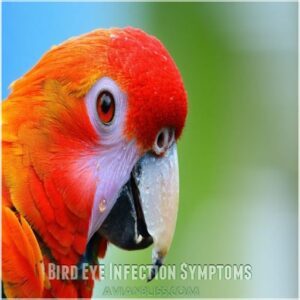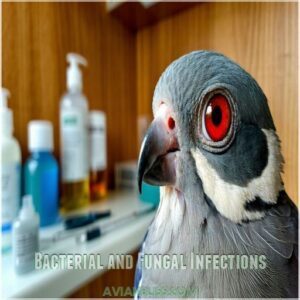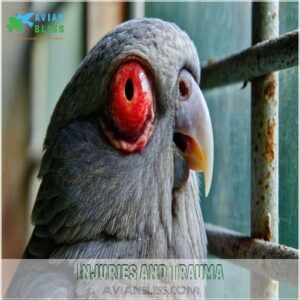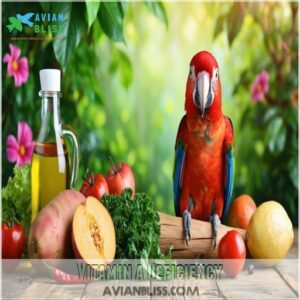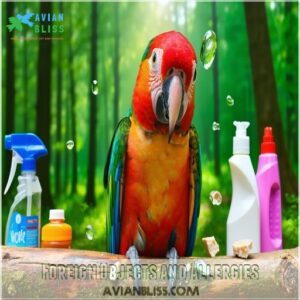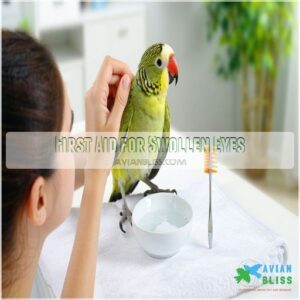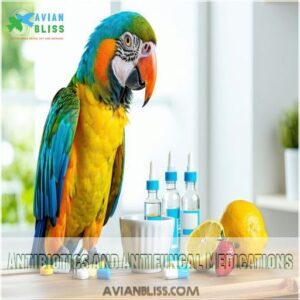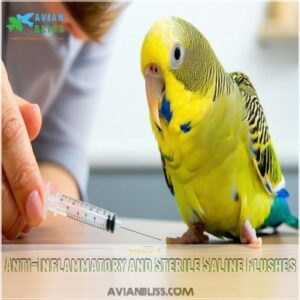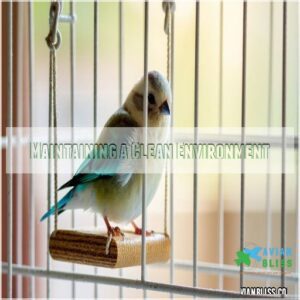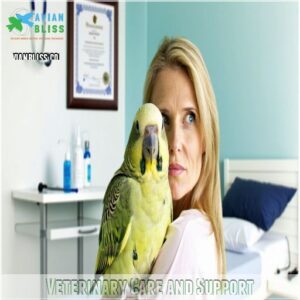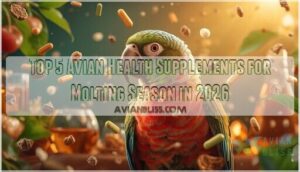This site is supported by our readers. We may earn a commission, at no cost to you, if you purchase through links.
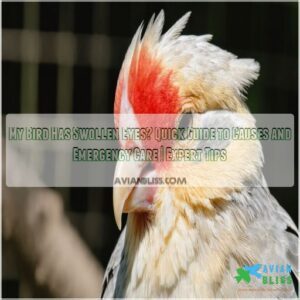
These puffy peepers could signal anything from a simple infection to vitamin A deficiency.
Look for telltale signs like redness, unusual discharge, or your feathered friend squinting more than usual.
Just like having sand in your eye, it’s uncomfortable for them and needs attention.
While bacterial infections are common culprits, other troublemakers include injuries, allergies, or fungal infections.
The good news? Most eye problems are treatable when caught early.
Understanding the root cause is key to getting your bird back to their bright-eyed, chirpy self.
Table Of Contents
- Key Takeaways
- Bird Eye Infection Symptoms
- Causes of Swollen Eyes
- First Aid for Swollen Eyes
- Treatment and Recovery
- Preventing Future Infections
- Frequently Asked Questions (FAQs)
- How do you treat a swollen bird’s eye?
- What causes birds’ eyes to swell?
- What does a bird eye infection look like?
- How do you treat a bird’s eye injury at home?
- How long does it take for eye swelling to subside?
- Can birds develop permanent eye damage from infections?
- What household items might irritate my birds eyes?
- Should I separate birds when one has eye issues?
- Are certain bird breeds more prone to eye problems?
- Conclusion
Key Takeaways
- If you notice swollen eyes in your bird, don’t delay – get veterinary care immediately since untreated infections can lead to permanent vision damage.
- You’ll need to watch for telltale signs like redness, unusual discharge, squinting, or your bird keeping its eyes closed more than usual – these symptoms often indicate infection or vitamin A deficiency.
- While waiting for vet care, you can gently clean your bird’s eyes with sterile saline solution and ensure their cage stays clean, but don’t try home remedies without professional guidance.
- You can prevent future eye problems by maintaining a balanced diet rich in vitamin A, keeping your bird’s environment free of irritants like air fresheners or cooking fumes, and scheduling regular wellness checkups.
Bird Eye Infection Symptoms
You’ll know your feathered friend might’ve an eye infection when you notice redness, swelling, or unusual discharge around their eyes, just like when you wake up with those annoying "sleep crusties" in the morning.
If you spot your bird squinting, keeping their eyes closed more than usual, or see their eyelids looking puffy, it’s time to take action and get them checked out by an avian vet.
Recognizing Redness and Discharge
When your feathered friend shows eye discharge or redness, it’s important to act fast.
You’ll notice different discharge colors – from clear to yellowish or greenish – which can signal various infection types.
Watch for crusty buildup around the eyes or sticky secretions that mat the feathers.
If there’s redness along with discharge, it’s often a warning sign of conjunctivitis or another eye infection requiring attention.
Identifying Swollen Eyelids and Cloudy Eyes
Your bird’s swollen eyelids and cloudy eyes can feel like a red flag waving in your face. Keep an eye out for these key signs of potential eye infection or vision problems:
- Puffy or inflamed eyelids that look like tiny pillows around your bird’s eyes
- A misty or foggy appearance in one or both eyes, similar to looking through frosted glass
- Unusual bulging or asymmetry between the eyes
Want to perform a quick eye examination? Just compare both eyes carefully – they should look nearly identical in size and clarity.
Understanding Squinting and Closed Eyes
Many birds show early signs of eye problems through squinting and closed eyes – it’s like they’re wearing invisible sunglasses.
If you notice your feathered friend keeping one or both eyes shut more than usual, it could signal eye strain causes or deeper vision problems.
Birds typically blink their eyes symmetrically, so any irregular behavior warrants an eye examination, especially if accompanied by eye discharge or swollen bird eyes.
Causes of Swollen Eyes
If you’ve noticed your bird’s eyes looking puffy or swollen, you’re probably worried about what’s causing it, and you’re right to be concerned.
Your feathered friend could be dealing with anything from a simple infection to a vitamin deficiency, but don’t worry – we’ll help you figure out what’s going on and what to do next.
Bacterial and Fungal Infections
Bacterial and fungal infections wreak havoc on your bird’s delicate eyes, often starting with swollen bird eyes and mild bacterial conjunctivitis.
Common culprits like E. coli, Staphylococcus, and eye fungus can quickly escalate if left untreated.
When you spot signs of infection control issues, like discharge or redness, it’s important to act fast.
For more information on bird conjunctivitis, understanding the symptoms and causes is key to effective treatment.
These microbial treatments need a vet’s expertise, as different infections require specific medications.
Injuries and Trauma
Bird eye swollen? It could be from eye trauma your feathered friend experienced.
Head trauma and collision damage often happen when birds crash into windows or cage bars.
Common injury causes include:
- Foreign objects scratching the eye during exploration or fights
- Eye lacerations from accidental beak injuries during preening
- Scratches from rough surfaces or sharp objects in their environment
Watch closely – swollen eyes after these incidents need immediate vet attention.
Vitamin a Deficiency
When your feathered friend’s eyes look swollen, vitamin A deficiency might be up in the mix of potential causes. This condition, known as hypovitaminosis A, can seriously impact your bird’s eye health. A bird health issue like this often stems from a lack of essential nutrients in their diet.
| Deficiency Signs | Nutrition Tips | Dietary Supplements |
|---|---|---|
| Swollen eyes | Fresh veggies | Vitamin A drops |
| Puffy eyelids | Sweet potato | Cod liver oil |
| Eye discharge | Dark leafy | Beta carotene |
Don’t wait to address these parrot eye health issues – proper nutrition can make all the difference.
Foreign Objects and Allergies
Beyond vitamin deficiencies, your feathered friend’s swollen eyes could be reacting to foreign objects or allergies. Even tiny particles can cause major eye irritation and inflammation in birds. Understanding parrot eye dilation is important in identifying the root cause of their swollen eyes.
- Dust allergies often trigger persistent eye irritants, especially in poorly ventilated spaces
- Loose feathers can get stuck and cause feather irritation around the eye area
- Common household items like air fresheners may spark unexpected allergic reactions
Keep their environment clean and watch for signs of object removal needs, which can help prevent eye irritation.
First Aid for Swollen Eyes
If you’ve noticed your bird’s eyes are swollen, don’t panic – you can take immediate steps at home while waiting for a vet visit.
You’ll need to gently clean the affected area and keep your feathered friend’s environment spotless, which we’ll show you how to do safely and effectively.
Cleaning The Eyes and Cage
If you spot your bird’s swollen eyes, start with gentle eye cleaning using sterile saline solutions. Dampen a soft cotton ball and carefully wipe from the inner corner outward to remove discharge.
Understanding parakeet eye cues is important in identifying potential health issues.
Don’t forget your bird’s living space – thoroughly sanitize the cage, perches, and toys with bird-safe disinfectant. Replace soiled bedding and food bowls daily to prevent bacteria growth that could worsen eye problems.
Providing Adequate Water and Nutrition
While your bird battles swollen eyes, keeping fresh water sources available is essential for healing.
Replace water twice daily and consider using specialized hydration methods like shallow dishes.
Focus on nutrient-rich foods packed with vitamin A to combat deficiency – think dark leafy greens and orange veggies.
Adding bird vitamin drops can help support your bird’s overall health during this time.
Add vet-approved dietary supplements to support recovery, ensuring your feathered friend gets a balanced diet for ideal eye health.
Documenting Symptoms and Behavior
Keeping detailed records helps your vet pinpoint what’s causing those swollen eyes in your bird. Just like a detective, you’ll want to track every clue.
Record changes in your feathered friend’s behavior and symptoms in a simple notebook or your phone.
- Note the date and time you first spotted eye problems
- Track eating and drinking patterns
- Record any behavioral changes like decreased activity
- Document environmental factors that might trigger symptoms
- Take clear photos to show symptom progression, which will help your vet understand the symptom progression.
Treatment and Recovery
You’ll be relieved to know that treating your bird’s swollen eyes doesn’t have to be a scary process, as most cases respond well to a combination of medications and proper care.
While your feathered friend recovers, you’ll need to follow your vet’s treatment plan, which typically includes antibiotics or antifungal medications, along with keeping their environment squeaky clean.
Antibiotics and Antifungal Medications
Once your vet has diagnosed your bird’s eye condition, they’ll likely prescribe specific medications. Here’s what you need to know about antibiotic eye drops and antifungal medications for bird eye infections:
When treating bird eye infections, understanding bird eye antibiotics and their role in recovery is key.
| Medication Type | Common Uses | Administration Tips |
|---|---|---|
| Antibiotic Drops | Bacterial infections | Apply directly to affected eye |
| Antifungal Meds | Fungal infections | Mix with water/food |
| Eye Ointments | Severe infections | Use gentle, steady hands |
Remember to complete the full course of medication, even if symptoms improve. Watch for medication side effects and contact your vet if you notice any changes in behavior.
Anti-Inflammatory and Sterile Saline Flushes
While antibiotics fight the infection, you’ll need to soothe your bird’s swollen eyes too.
Use store-bought sterile saline solutions for eye flush techniques – never make your own at home. For safe medication administration during bird eye care, gently squirt the solution with a clean syringe.
Anti-inflammatory eye drop therapy helps reduce discomfort, but remember – proper infection control means treating both symptoms and root causes, using proper infection control.
Maintaining a Clean Environment
During your bird’s eye treatment, keeping their space spotless is like giving them a healing sanctuary. A clean environment helps prevent infection rebound and speeds up recovery.
Using a bird safe cleaner is essential for maintaining a healthy space for your bird to recover in.
- Swap out cage liners daily and disinfect surfaces with bird-safe cleaners
- Use an air purifier to catch dander and dust
- Clean water dishes twice daily, using filtered water
- Gently wipe feathers around the eyes with warm, damp cotton
- Sanitize perches and toys weekly with vinegar solution to create a clean environment and support recovery
Veterinary Care and Support
Since bird eye infections can quickly become serious, finding an avian vet should be your top priority. Don’t wait until it’s an emergency – keep a list of bird hospitals and emergency services handy.
Understanding bird eye infection is essential for effective treatment and recovery. Your veterinary guidance might include specialized treatments, medications, or ongoing care plans.
Many pet insurance plans cover eye treatments, so it’s worth checking your policy. Trust your avian specialist’s expertise.
Preventing Future Infections
You’ll be happy to know that keeping your feathered friend’s eyes healthy isn’t rocket science – it’s all about creating good habits and staying watchful.
Just like you’d baby-proof a home, you can bird-proof your pet’s environment and catch potential problems before they turn into painful eye infections.
Balanced Diet and Nutrition
Your bird’s recovery starts with what’s on their plate.
A balanced diet packed with nutrient rich foods can prevent vitamin A deficiency, a common cause of eye problems.
Load up their bowl with fresh fruits, carrots, sweet potatoes, and healthy seeds.
When you’re picking dietary supplements, chat with your vet first – they’ll help you nail the right vitamin balance for your feathered friend’s specific needs.
Minimizing Stress and Regular Check-Ups
In preventing bird eye problems, stress reduction plays a vital role in your feathered friend’s health.
Smart cage maintenance and regular veterinary checkups can catch potential issues early.
Here are three key strategies for minimizing stress:
- Schedule quiet times daily for peaceful social interaction
- Create a consistent routine with environmental enrichment activities
- Book wellness exams every six months for early detection
Safe and Bird-Friendly Environment
Creating a birdsafe environment starts with setting up toxic-free zones throughout your home.
Bird proofing isn’t just about removing obvious dangers – it’s about smart cage sanitation and environmental enrichment too.
Set up quiet areas for stress-free rest, and keep cleaning supplies well away from your feathered friend’s space.
Remember, a clean environment is your best defense against bird eye health issues.
Monitoring for Signs of Illness
While your safe bird environment sets the stage for wellness, keeping your eyes peeled for health changes is your next power move.
Watch for these telling signs of eye problems that could signal bigger issues:
Understanding disease transmission methods is essential in identifying the root cause of your bird’s swollen eyes.
- Start a quick daily "health check" ritual during morning feeds – look for unusual squinting, discharge, or redness around your bird’s eyes
- Document behavior changes like reduced activity or appetite in a simple notes app
- Check your bird’s environment weekly for potential irritants that could trigger swollen eyes
Frequently Asked Questions (FAQs)
How do you treat a swollen bird’s eye?
Take your bird to an avian vet right away.
In the meantime, gently clean the eyes with sterile saline solution and keep the cage extra clean.
Don’t try home remedies without veterinary guidance.
What causes birds’ eyes to swell?
Birds’ eyes can swell due to allergies, bacterial or fungal infections, injuries from flying accidents, vitamin A deficiency, or parasites.
Environmental irritants like dust or smoke may also trigger inflammation around their eyes.
What does a bird eye infection look like?
Nearly 40% of pet birds experience eye infections annually.
You’ll notice redness around the eye area, swelling of the eyelids, watery or cloudy discharge, and your bird might squint or keep its eyes closed.
How do you treat a bird’s eye injury at home?
Gently clean around the eye with sterile saline solution, keep the cage clean, and make certain fresh water is available.
Don’t use medications without a vet’s approval – prompt professional care is essential for eye injuries.
How long does it take for eye swelling to subside?
Like watching a flower bloom in reverse, eye swelling typically subsides within 24-48 hours with proper care.
If you don’t see improvement after 2 days, you’ll need to visit an avian vet.
Can birds develop permanent eye damage from infections?
Yes, untreated eye infections can cause permanent damage to your bird’s vision, including scarring, blindness, or chronic conditions.
Quick veterinary care helps prevent these serious complications and protects your feathered friend’s sight.
What household items might irritate my birds eyes?
Common irritants lurking in your home include air fresheners, cleaning sprays, scented candles, cooking fumes, and cigarette smoke.
Even seemingly harmless items like hairspray and perfume can cause eye irritation in birds.
Should I separate birds when one has eye issues?
Separating birds when one shows eye problems is smart – it prevents potential infection spread and lets you monitor symptoms closely.
You’ll want to keep the affected bird in a clean, stress-free space while it heals.
Are certain bird breeds more prone to eye problems?
You’d think all birds have equal eye health, but that’s not true!
Budgies and cockatiels often face more eye issues, while larger parrots like macaws and African greys typically have stronger eye health.
Conclusion
Spotting those swollen eyes in your bird can be worrying, but you’re already on the right track by seeking help.
Remember, early action is your best defense against serious complications.
Keep your vet’s number handy, maintain a clean cage, and watch for any changes in your bird’s behavior.
If your bird has swollen eyes, don’t try to treat it yourself – get professional help right away.
With proper care and attention, your feathered friend will be back to their bright-eyed self in no time.
- http://www.azeah.com/Care-Sheets.asp?id=149
- https://www.merckvetmanual.com/poultry/infectious-bronchitis/infectious-bronchitis-in-chickens
- https://birdsupplies.com/blogs/news/a-closer-look-at-bird-eye-infections-and-how-to-treat-them
- https://avianbliss.com/bird-eye-infection-treatment/
- https://www.msdvetmanual.com/bird-owners/disorders-and-diseases-of-birds/eye-disorders-of-pet-birds

